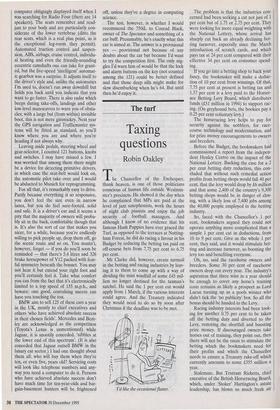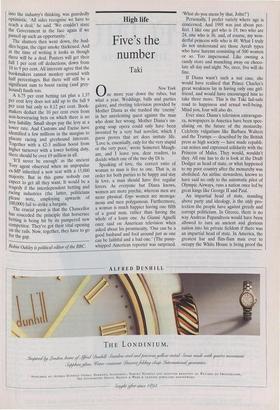The turf
Taxing questions
Robin Oakley
The Chancellor of the Exchequer, thank heaven, is one of those politicians conscious of human life outside Westmin- ster's precincts. He showed it the day when he complained that MPs are paid at the level of jazz saxophonists, work the hours of night club pianists and enjoy the job security of football managers. And although I know of no evidence that his famous Hush Puppies have ever graced the Turf, as opposed to the terraces at Notting- ham Forest, he did do racing a favour in his Budget by reducing the betting tax paid on off-course bets from 7.75 per cent to 6.75 per cent.
Mr Clarke did, however, create turmoil in the betting and racing industries by leav- ing it to them to come up with a way of dividing the mini windfall of some £45 mil- lion no longer destined for the taxman's satchel. He said the 1 per cent cut would apply from 1 March, if the various interests could agree. And the Treasury indicated they would need to do so by soon after Christmas if the deadline was to be met.
`I'd like the occasional flutter ' The problem is that the industries con- cerned had been seeking a cut not just of 1 per cent but of 1.75 or 2.75 per cent. They were looking for more equal weighting with the National Lottery, whose arrival has sharply cut back an already declining bet- ting turnover, especially since the March introduction of scratch cards, and which pays tax at 24 per cent compared with their effective 34 per cent on consumer spend- ing.
If you go into a betting shop to back your fancy, the bookmaker will make a deduc- tion of 10 per cent from winnings. Of that, 7.75 per cent at present is betting tax and 1.37 per cent is a levy paid to the Horser- ace Betting Levy Board, which distributes funds (£51 million in 1994) to support rac- ing. (On greyhound bets, the bookies pay a 0.25 per cent voluntary levy.) The horseracing levy helps to pay for security against the nobblers, for race- course technology and modernisation, and for prize money encouragements to owners and breeders.
Before the Budget, the bookmakers had commissioned a report from the indepen- dent Henley Centre on the impact of the National Lottery. Backing the case for a 2 per cent betting duty reduction, this con- cluded that without such remedial action profits from betting shops would fall 40 per cent, that the levy would drop by £6 million and that some 2,400 of the country's 9,300 betting shops would be in danger of clos- ing, with a likely loss of 7,400 jobs among the 40,000 people employed in the betting industry.
So, faced with the Chancellor's 1 per cent, bookmakers argued they could not operate anything more complicated than a simple 1 per cent cut in deductions, from 10 to 9 per cent. Give us the whole 1 per cent, they said, and it would stimulate bet- ting and increase turnover, so boosting the levy too and benefiting everyone.
Oh, no, said the racehorse owners and breeders. Some 30 per cent of racehorse owners drop out every year. The industry's aspiration that three wins in a year should be enough to cover any horse's training costs remains as likely a prospect as Lord Lucan turning up as a pools winner who didn't tick the 'no publicity' box. So all the bonus should be handed to the Levy.
Racing industry interests had been look- ing for another 0.75 per cent to be taken off the betting duty and diverted to the Levy, restoring the shortfall and boosting prize money. If discouraged owners take horses out of training, they point out, then there will not be the races to stimulate the betting which the bookmakers need for their profits and which the Chancellor needs to ensure a Treasury rake-off which currently amounts to some £355 million a year.
Stalemate. But Tristram Ricketts, chief executive of the British Horseracing Board, which, under 'Stoker' Hartington's astute leadership, has blown so much fresh air into the industry's thinking, was guardedly optimistic. 'All sides recognise we have to reach a deal,' he said. 'We couldn't stare the Government in the face again if we passed up such an opportunity.' The shutters then went down, the hud- dles began, the cigar smoke thickened. And at the time of writing it looks as though there will be a deal. Punters will get their full 1 per cent off deductions, down from 10 to 9 per cent. All interests agree that the bookmakers cannot monkey around with half percentages. But there will still be a significant sum to boost racing (and grey- hound) funds too.
A 6.75 per cent betting tax plus a 1.37 per cent levy does not add up to the full 9 per cent but only to 8.12 per cent. Book- makers deduct the 10 per cent even from non-horseracing bets on which there is no levy liability. Small shops pay the levy at a lower rate. And Customs and Excise have identified a few millions in the margins to placate racing and greyhound interests. Together with a £2-3 million boost from higher turnover with a lower betting duty, there should be over £9 million in all.
`It'll never be enough' as the ancient Tory agent observed when an unpopular ex-MP inherited a new seat with a 15,000 majority. But in this game nobody can expect to get all they want. It would be a tragedy if the interdependent betting and racing industries (the latter, politicians please note, employing upwards of 100,000) fail to strike a bargain. The crucial point is that the Chancellor has conceded the principle that horserace betting is being hit by its pampered new competitor. They've got their vital opening on the rails. Now, together, they have to go for the gap.
Robin Oakley is political editor of the BBC.



















































 Previous page
Previous page